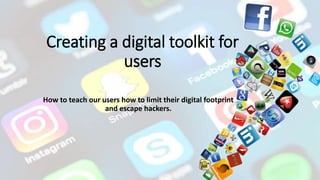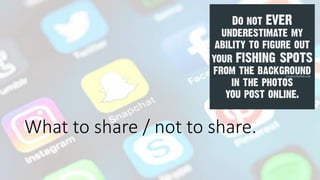Creating a digital toolkit for users: How to teach our users how to limit their digital footprint and escape hackers.
- 1. Creating a digital toolkit for users How to teach our users how to limit their digital footprint and escape hackers.
- 2. Justin Denton I’m a Technology Innovator, spent time developing new Technologies at IBM which were deployed to millions of new IBM machines between 2002 to 2011. I also was the Faculty Lead and acting Dean for the School of Technology at Rasmussen College. I’ve always focused on the continued implementation of technology into my day to day work to drive efficiencies. In my most recent endeavor I took on the role of a Director with Collegis Education to run a division of the company that is focused on supporting over 40 College’s and Universities’ online classroom environments. I’m currently focused on providing industry leading levels of support to the Higher Education Industry as well as grooming team members of the support center into high performing technology professionals. My passions are new technologies, education, business process development, and accelerating the growth of individuals through custom tailored learning technologies. https://www.linkedin.com/in/justindenton1/ Masters: Keller Graduate – Communications & Network Management Bachelors: Devry – Network & Telecommunications Management Certifications: ITIL Foundations, MCDST, MCP, & Crystal Reports
- 3. What are we talking about? • Ever wonder what you should or shouldn’t share on the internet? Do you see users who are posting everything thing they possibly could on the internet and wonder how to help educate them to protect themselves? • All of this collective sharing, creates a data gold mine for hackers to do their evil bidding. In this session we will talk about what to post on the internet and what not too. We will also look into what hackers can use from the information you’ve posted on the internet and how they can use it to gain access to your and your users personal lives, accounts, credit cards, and more. During this session, we’ll dive into building a strategy plan to help limit and hopefully eliminate these references from your digital footprint to help ensure you are more secure than you were when you first started this session. • By the end of this webinar, attendees will have a virtual toolkit and strategies to help educate users on protecting themselves while online.
- 4. Agenda • Social Media can be your worst enemy. • What to share / not to share. • What do hackers use this info for? • How to protect yourself. • How long does this stuff last after I delete it? • Are there tools to make this easier?
- 5. Social media can be your worst enemy.
- 7. Why should I worry about posting stuff? • Hackers can use it against you. • Criminals can find out when your not home. • Your personal information makes you more identifiable.
- 10. What to share / not to share.
- 11. Top items not to share… • Personally Identifiable Information • Phone number • Email address • Relatives Names • When you’re on vacation & where. • Money & Bank Information • Hints about passwords (ie Dogs Names, Mother’s Maiden Name, etc.) • Your Daily Schedule.
- 12. Who do you really know online? • Do you know who you are sharing too? • I have 1000’s of friends on Facebook, I can’t tell you if I know them all. • Would you share what your about to share with the public? • Would you scream it out loud inside Walmart?
- 13. What do hackers use this info for?
- 14. Hackers… • Harvest the data you post online to use against you. • Can use your posts to guess your passwords & account information. • Use your personal info to “Social Engineer” methods to obtain account information. • Role Playing / Impersonation • Digital Dumpster Diving • Use the old forgotten posts
- 15. Criminals / Scammers… • View your posts to know when you’re not home. • Make yourself a bigger target. • Victim of Social Engineering • That can you hear my call? • Don’t answer Yes. • Are you the lady of the house? • Do you pay the household bills? • Are you the homeowner?
- 16. Criminals / Scammers.. • Answering “Yes” on calls you don’t know • Typically end up signing up up for something • Just Say “No”. • Calls can and will be recorded.
- 17. How to protect yourself.
- 18. Protect yourself • Limit your Social Foot Print • Monitor your Friends • Watch what you post • Keep your Personally Identifiable Information private • Check your Security Settings • Facebook has public options that are enabled by default.
- 19. Protect yourself • How private you are online is up to you. - Manage it well • Be aware of what you share and with whom • Be sure to familiarize yourself with geolocation and location sharing. Check your settings to make sure you keep this information private. • Use Strong passwords & Don’t use something that people know • Remove unwanted internet posts/content • Periodically search your name
- 20. Erase yourself from the Internet • Although its difficult to do you may want to: • Delete your accounts from Social Media Sites. • Remove yourself from Background Check Sites
- 21. Sites that have your background info Intelius.com Acxiom.com MyLife.com ZabaSearch.com Spoke.com BeenVerified.com PeekYou.com USSearch.com PeopleFinders.com WhitePages.com Spokeo.com Radaris.com
- 22. How long does this stuff last after I delete it?
- 23. Its difficult to disappear • Online its hard to disappear • Delete accounts may not always remove past posts on others feeds • You posts may have been shared by others • May cause programmatical broken link errors • Cool-Off Period • May reactivate your account automatically if you accidentally logon
- 24. Background info sites • It only lasts as long as you don’t do anything that hits public record again. • If you get arrested, fight a public legal battle, get married, buy a new home, etc. • Then you’ll need to repeat the process for peace of mind.
- 25. Social media • Typically its instant • But some sites have data retention policies • Wait months possibly a year before it falls out completely • The Way Back Machine may keep your data forever • WikiDumps lets you download entire Wikipedia database • YouTube Downloaders allow you to download videos to your computer.
- 26. Are there tools to make this easier?
- 27. How to get off these sites? • Want to figure out how to remove yourself from the background search sites? • Check out site from LawyerCT • http://tinyurl.com/backgone
- 28. Speed it up • Account Killer maintain massive database of sites—more than 500 in all. App can provide direct links to each one's deletion page. • Just Delete Me offers a similar service, as well as a handy Chrome Extension that will light up whenever you're on a site that JDM recognizes and will link you directly to the site's account deletion page. • Knowem, finds sites that you may have forgotten about entirely by doing a username search on more that 500 popular social sites.
- 29. Speed it up • Deseat.me – Internet site aimed at cleaning up your online presence. • DeleteMe from Abine – Paid Service to continue monitoring and deleting your online presence.
- 30. Get a Status Check • Zabasearch: Zabasearch is mostly about finding addresses and phone numbers. Make a quick search of yourself and see what it knows. • Intelius: Intelius can perform background checks, hunt down criminal records, email addresses, social networks, and more. You have to pay to get your results, but you'll get a general idea of what's out there by simply searching your name. • Spokeo: Spokeo is essentially an address book and it can track you down suprisingly well to reveal your gender, age, phone number, address, relatives, marital status, and a whole lot more. Again, it costs a bit of money to get your full results, but you can get a general idea of what you need to snuff out. • Pipl: Pipl aggregates all of the above searches, but it's worth looking at to make sure no others have slipped through the cracks.
- 31. The checklist 1. Review your accounts, posts and Days of the Internet Past 2. Remove old unwanted content 3. Remove personally identifiable information 4. Use tools to speed up the process 5. Continue searching yourself
- 32. Get it? Got it? Good.
Editor's Notes
- #19: Accept friends that you know
































